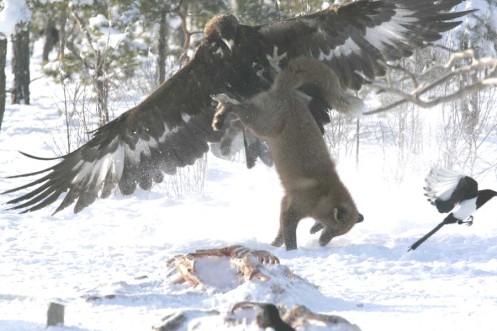Rilke’s Eighth Duino Elegy
From my own translation of Rilke’s Duino Elegies (Duiniser Elegien, 1923):
With all its eyes the creaturely world sees
openness. Only our eyes are
as if reversed and surround it quite
as traps around its freedom’s path.
What externality is we know only
from the animal’s face; for we already
turn round the early child and force it
to see figuration backwards, not the openness
that is so deep in the animal’s face. Free of death.
Death is all we see; the free animal
always has its demise behind it
and before it God, and when it moves, it moves
in eternity like running springs.
We never, not a single day, have
before us the pure space into which the flowers
endlessly open. Ever it is world
and never nowhere without not: the pure,
the unguarded we breathe and
endlessly know and do not desire. As a child
may in stillness there be lost to itself and be
shaken. Or someone dies and is it.
For close to death, death is no longer seen
and we stare outwards, perhaps with an animal’s great gaze.
Lovers, if it were not for the other
blocking sight, are close to it and wonder…
As if accidentally something is revealed
behind the other…But no one gets beyond
the other, and again all becomes world.
Always turned to Creation we only see
on it the reflection of the free,
darkened by ourselves. Or else that an animal,
a dumb animal, look up, quietly right through us.
This is called destiny: to be opposite
and nothing but that and always opposite.
If there were consciousness of our kind in the
secure animal that comes toward us
in the other direction – it would toss us around
with its transformation. But for itself its being is
infinite, ungrasped and without a glimpse
of its condition, pure, like its outward gaze.
And where we see future it sees everything
and itself in everything and for ever healed.
And yet in the watchful warm animal there lies
weight and worry of great melancholy.
For to it too always clings what often
overwhelms us, – memory,
as if what we seek were once already
closer to us, more loyal and its connection
infinitely tender. Here all is distance,
and there it was breath. After the first home
the second seems ambiguous and shaky.
O bliss of the tiny creature
that always remains in the engendering womb;
o joy of the gnat that still hops inside,
even when it marries: for womb is All.
And see the half-assurance of the bird
that almost knows both from its origins,
as if it were an Etruscan soul,
from a dead person that a space received
but with the resting figure as the lid.
And how dismayed is a thing that must fly
and stems from a womb. As if afraid
of itself it zigzags through the air like a crack
through a cup. The way the track
of a bat rips through the porcelain of evening.
And we: spectators, always, everywhere,
turned towards all this and never beyond!
It overwhelms us. We order it. It falls to pieces.
We order it again and fall to pieces ourselves.
So who has turned us around that we,
whatever we do, are in the position
of one who is leaving? Just as he
on the last hill that once more shows him
his whole valley, turns around, stops, lingers –,
thus do we live and are always taking leave.
[As usual WordPress will not recognise stanza breaks. I have thus indented lines to indicate breaks. ]
~ by Peter Lach-Newinsky on May 26, 2010.
Posted in metaphysics, poetry, Uncategorized
Tags: animals, death, Duino Elegies, innocence, poem, poetry, Rilke


peterlachnewinsky.wordpress.com’s done it once again. Great article!
Wow! Great translation! I love this elegy, and recently found it attached as an epigraph to this story:
http://sites.google.com/site/riparianphotography/the-riparian-fiction/chapter-last
I can’t vouch for the story, as I haven’t read it, but i love the epigraph!
Thanks John, much appreciated. Good to see some Rilke fans out there. Peter
It’s been a long time since I read his works. I recently ran across a page form Letters to a Young Poet on someone’s FB page, and this got me back to the Elegies. I must say that translating them–or most poetry, I guess–is a real challenge. I keep trying to think of better ways to translate the final lines of the Eighth Elegy, but either I feel like I am taking too much liberty with the original, or it sounds too dry.
Thanks John. Yes, the perennial problems of poetry translation, finding that difficult balance between too free and too literal/dry. Here I’ve decided to err on the side of the accurate/literal/dry. I’m sure there are much better translations, particularly where the translator has been a little freeer than I have been. What I have tried to do, for what it’s worth, is to do justice to Rilke’s sometimes strange suspension of syntax, give a feel for that in English. All the best, Peter
Thanks John. Have posted a comment on the blog. All the best, Peter